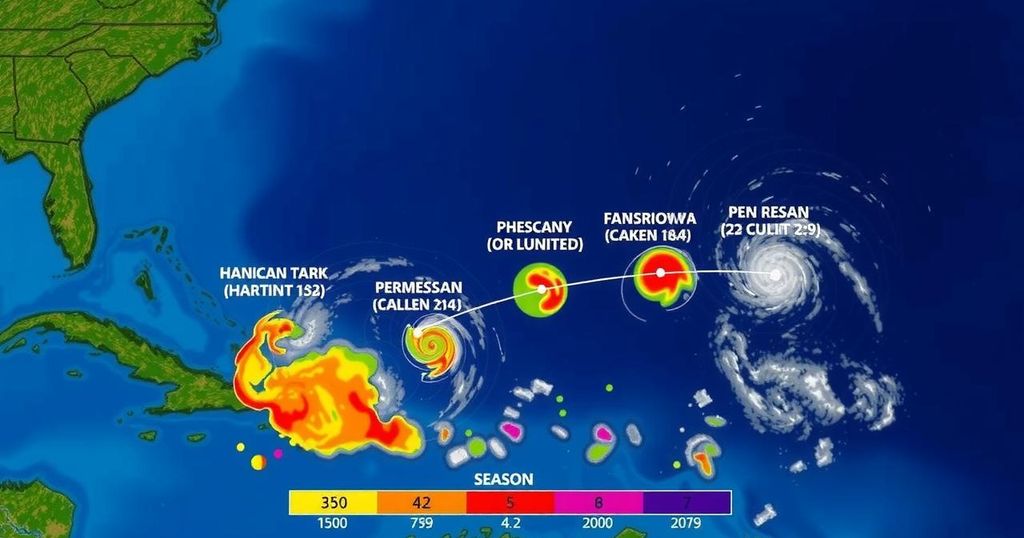The 2024 Atlantic Hurricane Season: A Record-Setting Year of Storm Activity
The 2024 Atlantic hurricane season recorded 18 named storms and was notable for its unusual activity patterns, including a post-September surge. The season highlighted severe hurricanes, particularly Helene, resulting in extensive damage and fatalities. NOAA’s improved forecasting and innovative research technologies significantly contributed to better storm monitoring and prediction accuracy, emphasizing the need for advanced hurricane preparedness strategies.
The 2024 Atlantic hurricane season, concluding on November 30, displayed above-average activity with a total of 18 named storms. Among these, 11 were hurricanes and 5 escalated to major hurricanes, consistent with NOAA’s forecasts. The season’s tumultuous start was followed by a lull, before a surge of activity, particularly post-September 25, when 12 named storms formed, setting a new record for this period. Notably, Hurricane Helene struck as the deadliest hurricane since Katrina, causing catastrophic impacts especially in North Carolina and South Carolina, with reported fatalities exceeding 150.
The season was marked by remarkable storms including Hurricane Beryl, which became the earliest Category-5 hurricane in the Atlantic, and Hurricane Milton, which intensified with unprecedented rapidity causing significant tornado outbreaks. Enhanced forecasting capabilities were implemented, yielding historically accurate predictions throughout the season. NOAA’s advancements in modeling and new technology during missions, such as the deployment of uncrewed aircraft systems, aided in collecting essential atmospheric data. Furthermore, NOAA’s initiatives to monitor ocean conditions contributed valuable data for refining intensity forecasts.
The performance of this season reflects NOAA’s commitment to safeguarding lives and property through scientific research and predictive capabilities, as stated by Rick Spinrad, Ph.D., NOAA Administrator. Overall, the season underlines the increasing necessity for effective hurricane monitoring and response systems as climate influences storm activities.
The Atlantic hurricane season is an annual period characterized by the cyclical formation of tropical storms and hurricanes, typically from June 1 to November 30. NOAA’s Climate Prediction Center provides forecasts based on various climatological factors and historical data. The impact of climate change and sea surface temperatures is paramount in analyzing storm patterns and their intensification. The capacity for accurate prediction is vital for disaster preparedness, as evidenced by the tragic effects of prior hurricanes on communities, particularly in the U.S. Southeast. This background sets the stage for understanding the significance of NOAA’s research and forecasting advancements in the context of increasing storm activity and intensity.
In summary, the 2024 Atlantic hurricane season demonstrated high activity levels exceeding initial predictions, with Hurricane Helene alone marking a critical milestone in mortality associated with hurricanes. NOAA’s research and forecasting improvements, coupled with enhanced monitoring technologies, played a crucial role in mitigating risks associated with severe weather. This year’s events underscore the importance of ongoing advancements in hurricane prediction and resource allocation for disaster response.
Original Source: www.noaa.gov




Post Comment